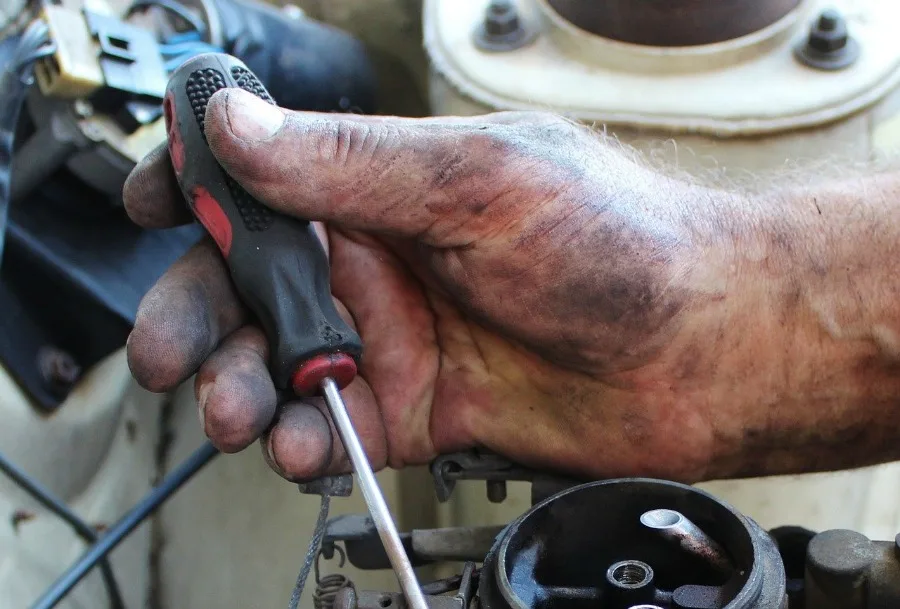You’re driving down the highway without a care in the world when it happens – the check engine light has come on. You get a sinking feeling in your stomach as your mind begins to conjure up a repair bill in the thousands of dollars range without even considering the possible reasons why your check engine light is on. Okay, so that may be a tad dramatic. But, believe it or not, many people opt to ignore the check engine light instead of possibly facing an expensive repair bill. And that’s the exact wrong thing to do as you could make a minor issue turn into a costly repair.

Likely Reasons Your Check Engine Light is On
The check engine light may be indicating a simple problem that’s an easy fix – such as a loose gas cap. Or, it could be a warning of a more serious issue. Here are five common reasons your check engine light is on.
1. Loose Gas Cap
As silly as it sounds, a missing, loose, or damaged gas cap will trigger your check engine light. This is because the gas cap seals the fuel system and maintains pressure. When the cap is loose, damaged, or missing, fuel vapors leak out. This increases harmful emissions, negatively impacts fuel efficiency, and throws your whole fuel system off.
So before taking your car in, make sure the cap you have is closed, tightened securely, and that there are no cracks. If you need a new gas cap, they run about $5 at an auto parts shop. Also, keep in mind that it may take a few minutes of driving for the light to switch off if the gas cap was the issue.
2. Spark Plugs and Wires Need Replacing
A second possible reason your check engine light is on could be due to the spark plugs and spark plug wires. The spark plugs are what provides the spark that ignites the air and fuel mixture within the cylinders. This ignition is what keeps your car moving. If they are not checked regularly, cleaned, or changed when needed, they can cause poor fuel efficiency and poor performance.
If they are the issue, you need to get your spark plugs replaced immediately. It’s an inexpensive fix and one that will help prevent a ton of other costly repairs down the line.
3. Catalytic Converter Failure
Another possible reason your check engine light comes on is because of the catalytic converter. In general, this is the part of your vehicle’s exhaust system that converts carbon monoxide into carbon dioxide, making less of an impact on our atmosphere and helping your vehicle run efficiently. Without proper maintenance, the catalytic converter can become damaged and fail. A failing catalytic converter can negatively affect performance and fuel economy, cause your car to run at higher temperatures, and even cause you to fail emissions tests.
Unfortunately, a failing catalytic converter usually has to be replaced which can cost up to $2,000. While no car owner wants to have to pay this, not doing so can potentially harm the engine and fuel system in the long run. So be sure to get your vehicle into an experienced mechanic as soon as possible.
4. Mass Airflow Sensor Failure
A mass airflow sensor failure is another possible reason your check engine light is on. This sensor is what tells your car’s computer the amount of air entering your engine and determines how much fuel is needed to run the engine efficiently. If it fails, your car can stall, have poor gas mileage, and fail emissions testing. It can also damage the spark plugs, O2 sensors, and even the catalytic converter.
A mass airflow sensor replacement can cost anywhere from $200 up to $400. One of the best ways to prevent this from happening is to replace your air filter as recommended by your vehicle’s manufacturer.
5. Bad Oxygen Sensor
Another possible reason your check engine light is on is due to a bad oxygen sensor. This sensor monitors the amount of unburned oxygen in your car’s exhaust fumes. It also monitors how much fuel is burned. Over time, these sensors get covered in dirt and oil which will reduce the functionality of the sensor. And when an oxygen sensor fails, it can cause a decrease in fuel economy as well as have a negative impact on the spark plugs or your catalytic converter.
Replacing an oxygen sensor usually costs around $200. Not fixing it can lead to several other problems that are a lot more expensive to fix.
Final Thoughts on Reasons Your Check Engine Light Is On
When the check engine light comes on in your car, unless your car has a visible and noticeable problem, there is generally no need to panic. Instead, consider the above list of possible reasons your check engine light is on. Then, if you aren’t able to determine the cause, take your car to a mechanic as soon as possible. Ignoring the light or choosing to put it off until later could lead to further damage and more costly repairs.
